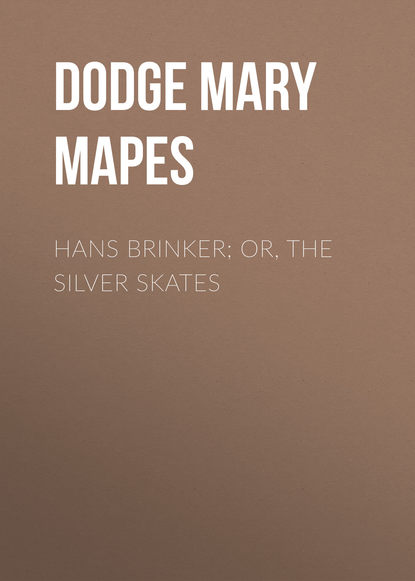По всем вопросам обращайтесь на: info@litportal.ru
(©) 2003-2024.
✖
Hans Brinker; Or, The Silver Skates
Настройки чтения
Размер шрифта
Высота строк
Поля
Boys and girls were chasing each other, and hiding behind the one-horse sleds, that, loaded high with peat or timber, pursued their cautious way along the track marked out as "safe." Beautiful, queenly women were there, enjoyment sparkling in their quiet eyes. Sometimes a long file of young men, each grasping the coat of the one before him, flew by with electric speed; and sometimes the ice squeaked under the chair of some gorgeous old dowager, or rich burgomaster's lady – who, very red in the nose, and sharp in the eyes, looked like a scare-thaw invented by old father Winter for the protection of his skating grounds. The chair would be heavy with footstoves and cushions, to say nothing of the old lady. Mounted upon shining runners it slid along, pushed by the sleepiest of servants, who, looking neither to the right nor the left, bent himself to his task while she cast direful glances upon the screaming little rowdies who invariably acted as body-guard.
As for the men, they were pictures of placid enjoyment. Some were attired in ordinary citizen's dress; but many looked odd enough with their short woolen coats, wide breeches, and big silver buckles. These seemed to Ben like little boys who had, by a miracle, sprung suddenly into manhood, and were forced to wear garments that their astonished mothers had altered in a hurry. He noticed, too, that nearly all the men had pipes, as they passed him whizzing and smoking like so many locomotives. There was every variety of pipes from those of common clay to the most expensive meerschaums mounted in silver and gold. Some were carved into extraordinary and fantastic shapes, representing birds, flowers, heads, bugs, and dozens of other things; some resembled the "Dutchman's pipe" that grows in our American woods; some were red, and many were of a pure snowy white; but the most respectable were those which were ripening into a shaded brown – The deeper and richer the brown, of course the more honored the pipe, for it was a proof that the owner, if honestly shading it, was deliberately devoting his manhood to the effort – What pipe would not be proud to be the object of such a sacrifice!
For a while, Ben skated on in silence. There was so much to engage his attention that he almost forgot his companions. Part of the time he had been watching the ice-boats as they flew over the great Haarlemmer Meer (or Lake), the frozen surface of which was now plainly visible from the canal. These boats had very large sails, much larger, in proportion, than those of ordinary vessels, and were set upon a triangular frame furnished with an iron "runner" at each corner, – the widest part of the triangle crossing the bow, and its point stretching beyond the stern. They had rudders for guiding, and brakes for arresting their progress; and were of all sizes and kinds, from small, rough affairs managed by a boy, to large and beautiful ones filled with gay pleasure parties, and manned by competent sailors, who smoking their stumpy pipes, reefed and tacked and steered with great solemnity and precision.
Some of the boats were painted and gilded in gaudy style and flaunted gay pennons from their mastheads; others white as snow, with every spotless sail rounded by the wind, looked like swans borne onward by a resistless current. It seemed to Ben as, following his fancy, he watched one of these in the distance, that he could almost hear its helpless, terrified cry, but he soon found that the sound arose from a nearer and less romantic cause – from an ice-boat not fifty yards from him, using its brakes to avoid a collision with a peat-sled.
It was a rare thing for these boats to be upon the canal and their appearance generally caused no little excitement among skaters, especially among the timid; but to-day every ice-boat in the country seemed afloat or rather aslide, and the canal had its full share.
Ben, though delighted at the sight, was often startled at the swift approach of the resistless, high-winged things threatening to dart in any and every possible direction. It required all his energies to keep out of the way of the passers-by, and to prevent those screaming little urchins from upsetting him with their sleds. Once he halted to watch some boys who were making a hole in the ice preparatory to using their fishing spears. Just as he concluded to start again, he found himself suddenly bumped into an old lady's lap. Her push chair had come upon him from the rear. The old lady screamed, the servant who was propelling her gave a warning hiss – In another instant Ben found himself apologizing to empty air; the indignant old lady was far ahead.
This was a slight mishap compared with one that now threatened him. A huge ice-boat, under full sail, came tearing down the canal, almost paralyzing Ben with the thought of instant destruction. It was close upon him! He saw its gilded prow, heard the schipper shout, felt the great boom fairly whizz over his head, was blind, deaf and dumb all in an instant, then opened his eyes, to find himself spinning some yards behind its great, skate-like rudder. It had passed within an inch of his shoulder, but he was safe! safe to see England again, safe to kiss the dear faces that for an instant had flashed before him one by one – father, mother, Robby and Jenny – that great boom had dashed their images into his very soul. He knew now how much he loved them. Perhaps this knowledge made him face complacently the scowls of those on the canal who seemed to feel that a boy in danger was necessarily a bad boy needing instant reprimand.
Lambert chided him roundly.
"I thought it was all over with you, you careless fellow! Why don't you look where you are going? Not content with sitting on all the old ladies' laps, you must make a Juggernaut of every ice-boat that comes along. We shall have to hand you over to the aanspreekers yet, if you don't look out!"
"Please don't," said Ben, with mock humility – then seeing how pale Lambert's lips were, added in a low tone:
"I do believe I thought more in that one moment, Van Mounen, than in all the rest of my past life."
There was no reply, and, for a while, the two boys skated on in silence.
Soon a faint sound of distant bells reached their ears.
"Hark!" said Ben, "what is that?"
"The carillons," replied Lambert. "They are trying the bells in the chapel of yonder village. Ah! Ben, you should hear the chimes of the 'New Church' at Delft; they are superb – nearly five hundred sweet-toned bells, and one of the best carilloneurs of Holland to play upon them. Hard work, though; they say the fellow often has to go to bed from positive exhaustion, after his performances. You see, the bells are attached to a kind of keyboard, something like they have on piano-fortes; there are also a set of pedals for the feet; when a brisk tune is going on, the player looks like a kicking frog fastened to his seat with a skewer."
"For shame," said Ben, indignantly.
Peter had, for the present, exhausted his stock of Haarlem anecdotes, and now, having nothing to do but to skate, he and his three companions were hastening to "catch up" with Lambert and Ben.
"That English lad is fleet enough," said Peter; "if he were a born Hollander he could do no better. Generally these John Bulls make but a sorry figure on skates – Hollo! Here you are, Van Mounen; why, we hardly hoped for the honor of meeting you again. Who were you flying from in such haste?"
"Snails," retorted Lambert. "What kept you?"
"We have been talking – and, beside, we halted once to give Poot a chance to rest."
"He begins to look rather worn out," said Lambert in a low voice.
Just then a beautiful ice-boat with reefed sail, and flying streamers, swept leisurely by. Its deck was filled with children muffled up to their chins. Looking at them from the ice you could see only smiling little faces imbedded in bright-colored, woolen wrappings. They were singing a chorus in honor of Saint Nicholas. The music, starting in the discord of a hundred childish voices, floated, as it rose, into exquisite harmony:
Friend of sailors, and of children!
Double claim have we,
As in youthful joy we're sailing,
O'er a frozen sea!
Nicholas! Saint Nicholas!
Let us sing to thee.
While through Wintry air we're rushing,
As our voices blend,
Are you near us? Do you hear us,
Nicholas, our friend?
Nicholas! Saint Nicholas!
Love can never end.
Sunny sparkles, bright before us,
Chase away the cold!
Hearts where sunny thoughts are welcome
Never can grow old —
Nicholas! Saint Nicholas! —
Never can grow old!
Pretty gift and loving lesson,
Festival and glee,
Bid us thank thee as we're sailing
O'er the frozen sea —
Nicholas! Saint Nicholas!
So we sing to thee!
XX
JACOB POOT CHANGES THE PLAN
The last note died away in the distance. Our boys, who in their vain efforts to keep up with the boat, had felt that they were skating backward, turned to look at one another.
"How beautiful that was!" exclaimed Van Mounen.
"Just like a dream!" said Ludwig.
Jacob drew close to Ben, giving his usual approving nod, as he spoke:
"Dat ish goot. Dat ish te pest vay – I shay petter to take to Leyden mit a poat!"
"Take a boat!" exclaimed Ben, in dismay – "why, man, our plan was to skate, not to be carried like little children – "
"Tuyfels!" retorted Jacob, "dat ish no little – no papies – to go for poat!"
The boys laughed, but exchanged uneasy glances. It would be great fun to jump on an ice-boat, if they had a chance; but to abandon so shamefully their grand undertaking – Who could think of such a thing?
An animated discussion arose at once.
Captain Peter brought his party to a halt.
"Boys," said he, "it strikes me that we should consult Jacob's wishes in this matter. He started the excursion, you know."
"Pooh!" sneered Carl, throwing a contemptuous glance at Jacob, "who's tired? We can rest all night at Leyden."






